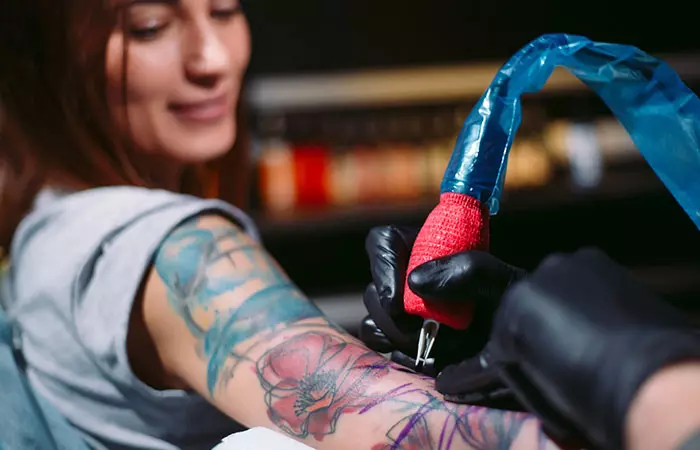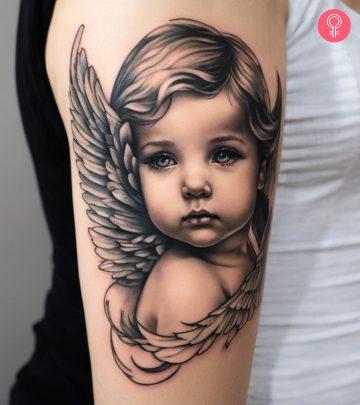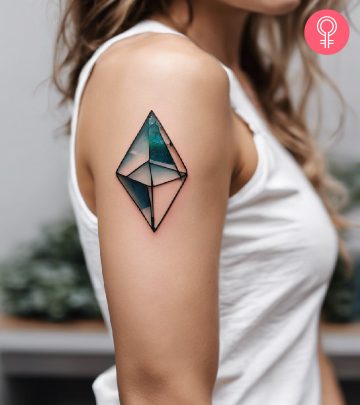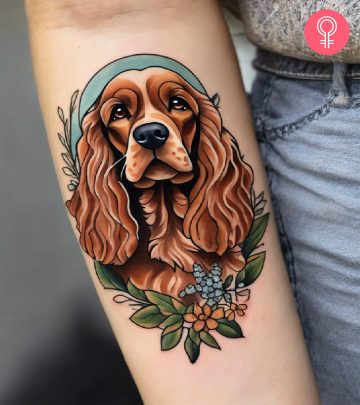Can You Get A Tattoo While Pregnant?
All you need to know about the dangers of getting inked during pregnancy.

Image: Shutterstock
In the case of many planned pregnancies, the period is all about experiencing a plethora of emotions while preparing to create and welcome a new life into the world. If you want to get a tattoo to commemorate this journey, you might find yourself wondering, “Can you get a tattoo while pregnant?”. While there are no studies to prove that a tattooing process during pregnancy is dangerous, you should be aware that there are no studies to prove it is completely safe either.
Pregnancy is a very special time for most expecting mothers, but scientifically, it also makes them vulnerable to health risks. Such an ambiguous predicament calls for awareness and precautionary measures that we are happy to provide. Keep reading this article for detailed insights into what getting a tattoo while pregnant might entail.
In This Article
Can You Get A Tattoo While Pregnant?

The exact extent of the dangers of getting a tattoo while pregnant is unknown. However, you need to keep in mind that the adaptive immune responses of the human body are weakened during pregnancy (1). To put it simply, pregnancy impacts the immune system of the body in a way that slows down or alters its ability to adapt to change. Enough studies explaining exactly how these changes manifest are not available, but it is an important point to note. This is why most doctors would recommend women to be cautious with any activity that may strain their systems more than regular everyday tasks. It is better to consult with a doctor before getting a tattoo.
While you can get a tattoo while pregnant, a slow immune system poses a risk of infections. In the following section, let us explore if there is an ideal time to get a tattoo during the pregnancy period.
Key Takeaways
- Getting a tattoo while pregnant comes with underlying health risks due to an altered immune system.
- The potential risks of getting tattooed while pregnant include infections such as Hepatitis, HIV, MRSA, and allergic reactions.
- An experienced and reputable tattoo artist can help you get through a safe and comfortable tattoo process during pregnancy but it is important to cross-check everything about them.
- Henna tattoo is a temporary, but safer alternative to permanent ink tattoos. However, avoid using black henna as it contains PPD.
Can You Get A Tattoo In The First Trimester?

There is no scientifically established timeline or hard and fast rule about how far along in the pregnancy it is safer or riskier to get a tattoo done. However, most medical professionals recommend holding off on getting inked at least until the second trimester when all the fetus’s organs are developed.
Some tattoo inks may contain metal-based chemicals such as lead, mercury, or arsenic. Research has shown that these chemicals can have adverse reactions on the fetus in the first trimester when the organs are still in the developing stage (2). These chemicals can also impact the baby’s brain development.
These occurrences are not common. However, there is always an underlying risk to getting tattoos while you are pregnant. Learn more about the risks involved in it in the next section.
Risks Of Getting A Tattoo While Pregnant

A tattoo process during pregnancy can put the mother and their fetus at potential risk of contracting bloodborne infections, such as the following:
1. Hepatitis B And C
Hepatitis B and C are contagious blood infections that cause liver inflammation. These infections spread when the blood or bodily fluids of an infected person enter a healthy person’s body. Hence, if a dirty needle that has been used on an infected person pierces another’s skin, the infection can spread easily. It can also be transmitted from a mother to their baby during labor and delivery (3). While you may take a vaccine to prevent Hepatitis B, there are no preventive vaccines for Hepatitis C.
2. Human Immunodeficiency Virus (HIV)
HIV is a virus that is commonly known to spread through sexual transmission, but it can also spread through infected blood. From here, the unborn baby can also contract the virus (4). Although HIV spreading from tattoo parlors is not a commonly reported occurrence, largely owing to professionals following adequate hygiene and safety precautions, there is a possibility of this happening when done irresponsibly.
3. Methicillin-Resistant Staphylococcus Aureus (MRSA)
MRSA is a fatal type of contagious bacterial infection that is resistant to many antibiotics. If left untreated, this infection can lead to illnesses such as pneumoniai A common lung infection that may occur as a complication of the flu or other viruses, bacteria and fungi. and sepsisi A potentially life-threatening condition that occurs when the body attacks its own tissues and organs as a response to an infection. . There have been reported instances of this infection spreading through the use of unclean needles for tattoos (5). Contact with an infected artist, unclean needle, or other contaminated equipment can potentially put you at risk of infection. However, there is no scientific evidence that this condition can be transferred from mother to baby during pregnancy or delivery.
4. Allergic Reactions
Some people may be allergic to chemicals in the tattoo ink used. This condition is commonly called ink allergy and is characterized by itchiness, blisters, swelling, fever, inflammation, or breathing difficulties. Such allergic reactions may also trigger psoriasisi A non-contagious skin disorder that is characterized by inflammation, redness, and itchiness in the skin. flare-ups (6). Research indicates that certain tattoo colors, such as red, may lead to serious reactions due to the presence of toxic components like cadmium, mercury, aluminium, and more (7).
The transmission of skin conditions from mother to baby is known to be rare unless severe (8).
While these risks remain, you may consider safe ways to get your commemorative pregnancy tattoo done. Keep reading to learn some useful safety tips in the next section.
How To Prepare For Getting A Tattoo While Pregnant

Once you are done with all the necessary research and medical consultations and decide to go ahead with a tattoo, take the following safety measures to ensure the procedure is worthwhile and free of discomfort.
- Look up reputable tattoo parlors in your area. Research your artist, their establishment, and their client reviews thoroughly. These things will help you gauge the credibility of the artists and assess if their practices are ethical.
- Get in touch with the artist and tell them your requirements. Many establishments refuse to work with pregnant clients due to the underlying risks that they are not willing to take responsibility for. However, you shall come across artists who are experienced, knowledgeable, and confident enough to make the process memorable for you.
- Ask your tattoo artist if you need to take any special precautions before the appointment since you are pregnant.
- Do check if all safety precautions are being followed on the day of your tattoo appointment. Ensure the artist is using sterile equipment, a single-use needle, and disposable gloves (reconsider if you have latex allergies). Inquire about the last time the booth was sanitized or disinfected and note if the surface is clean.
- Make sure the artist freshly opens the needle and ink packages in front of you.
- Make note of the aftercare instructions your artist provides and take their contact details for further guidance, just in case.
The rules are basically the same, except you have to be extra cautious to avoid putting your baby at risk. In the next section, let us consider the impact it may have on a tattoo removal process.
Can You Get A Tattoo Removed While Pregnant?
There is no scientific evidence suggesting that laser tattoo removals can pose any health risks for the mother or the fetus during pregnancy. However, many doctors would recommend you to avoid it during this period if it is not urgent as it is always best to be cautious.
 Fun Fact
Fun FactHowever, there may be other complications after getting a tattoo during pregnancy. Let us learn about them in the next section.
Can Getting A Tattoo During Pregnancy Cause Miscarriage?

There is a potential risk of miscarriage following a tattoo process during pregnancy. As discussed earlier, certain tattoo inks may contain heavy metals such as lead, arsenic, mercury, and so on. Research has shown that exposure to these metals during pregnancy can increase the risk of premature delivery, low birth weight, spontaneous abortion (SA), or stillbirth (9).
You may take measures against these adverse effects by checking the kind of inks that are used in tattoo parlors near you. You can also talk to medical experts to confirm if the ingredients in the ink you opt for are safe.
If these risks sound intimidating, you may consider a temporary alternative, such as a henna tattoo. Go for organic brands and ask a henna artist to design something meaningful for you. A lot of mothers these days are opting for this sustainable method for their pregnancy tattoo, and it is just as wholesome. However, be mindful of black henna as it contains para-phenylenediamine (PPD) which is known to cause long-lasting reactions on the skin (10).
Deborah Kennedy, a lifestyle blogger, shares her experience of getting a henna tattoo on her pregnant belly and claims it was a fun experience despite her skin being itchy from some natural ingredients used in it. “I’m happy I got my belly painted with henna, but if I ever do it again, I’ll probably specify that it was super itchy and request that the henna paint be made without lemon juice. If I don’t touch it too much, then it doesn’t itch, but any kind of touch, including clothes, starts to irritate my belly. Kind of a bummer, but that’s okay (i),” she says.
Apart from henna, there are other alternative options you can consider instead of getting a tattoo when pregnant. Keep reading to know more!
Alternative Options
While there is no concrete evidence that getting a tattoo can affect your pregnancy and the health of your unborn child, it is recommended to be safe than sorry. Why not wait a few months until your child is born and then think about getting permanently marked? There are other ways you can get creative and decorate your body without any concern, such as:
- Temporary tattoos come in many styles and can be changed as often as you like. You can get readymade tattoo stencils and then just apply them at home.
- You can also try body paint or ink-free tattoo stencils to experiment with designs before getting a permanent one later.
- If you have a specific tattoo in mind, you can sketch it out or work with an artist to refine the design so it’s ready for when you can safely get inked. They can try out the design with safe temporary ink, using natural stainers such as Jagua juice. You can also try airbrush tattooing.
 Trivia
TriviaConclusion
A pregnancy tattoo does seem like an appealing way to honor your journey as a mother-to-be. It can serve as a reminder of everything you go through to create a beautiful life. While there is no scientific evidence of the tattoo process being dangerous for expecting mothers, the vulnerability against certain infections can turn the experience bitter for you. If there is no urgency, it is ideal to wait until after the delivery of the baby to get your tattoo to avoid any tattoo side effects before birth. Nonetheless, we have provided you with everything you need to be aware of, and it should help you be prepared for getting body art during pregnancy in case you opt for it. So, take all the necessary precautions and as little stress as possible to ensure a safe and memorable pregnancy!
Frequently Asked Questions
Can you get a tattoo over stretch marks?
Yes. You can get a tattoo on your stretch marks. However, be aware that you may experience a bit more skin sensitivity in those areas when compared to other parts of your body. Also, be mindful about getting a tattoo on fresh stretch marks as the itchiness might get exacerbated.
Do pregnant individuals face social stigma for getting tattoos during pregnancy?
There is a social stigma associated with tattoos in general regardless of whether an individual is pregnant or not. The intensity of the stigma may vary depending on the social environment an individual is a part of.
How might hormonal changes during pregnancy affect the tattooing and healing process?
About 90% of pregnant women experience changes in the skin due to fluctuating hormone levels. The skin becomes more sensitive and prone to conditions that cause itching or burning sensation (6). This can cause an untoward reaction or pain while getting a tattoo.
Do different tattoo styles or sizes affect the safety of getting a tattoo during pregnancy?
The potential risks of infection while getting a tattoo during pregnancy remain the same irrespective of the style and size of the permanent tattoo done. However, since the skin is sensitized, and regular movement altered due to the presence of a growing fetus, sitting for longer hours under the needle can cause added discomfort to the mother.
Are there specific areas of the body where getting a tattoo might be safer during pregnancy?
There are no body parts that are considered specifically safer during pregnancies. If you consider the technicalities, you might want to avoid the hips, abdomen, and breasts as the skin here is about to expand and contract. Lower back tattoos may interfere with the epidural process. And generally avoid the bikini area as they might feel more uncomfortable.
Can stress or anxiety from the tattooing process affect the pregnancy?
The impact of stress and anxiety from the tattoo process can vary from person to person. If you are concerned about this, you are probably not confident about the procedure, and it is better to hold it off until your baby is safely born.
Illustration: Can You Get A Tattoo While Pregnant?

Image: Stable Diffusion/StyleCraze Design Team
Getting a tattoo while pregnant is not advised due to an increased risk of bloodborne infections. In the following video, a nurse explains the associated risks with the process, how it can affect your baby, and some general safety tips to follow. Check it out to learn more!
Personal Experience: Source
StyleCraze's articles are interwoven with authentic personal narratives that provide depth and resonance to our content. Below are the sources of the personal accounts referenced in this article.
(i). Pregnant Belly Henna Art!https://wheresmydreamlife.blogspot.com/2014/09/pregnant-belly-henna-art.html
References
Articles on StyleCraze are backed by verified information from peer-reviewed and academic research papers, reputed organizations, research institutions, and medical associations to ensure accuracy and relevance. Read our editorial policy to learn more.
- The influence of pregnancy on systemic immunity
https://www.ncbi.nlm.nih.gov/pmc/articles/PMC7091327/ - Early pregnancy exposure to metal mixture and birth outcomes – A prospective study in Project Viva
https://www.ncbi.nlm.nih.gov/pmc/articles/PMC8842844/ - Viral hepatitis and pregnancy
https://idp.nature.com/authorize?response_type=cookie&client_id=grover&redirect_uri=https%3A%2F%2Fwww.nature.com%2Farticles%2Fs41575-020-00361-w - Information for pregnant women who have HIV
https://www.ncbi.nlm.nih.gov/pmc/articles/PMC2817775/ - The risk of bacterial infection after tattooing
https://www.aerzteblatt.de/int/archive/article/182859 - Tattoo-induced psoriasis
https://www.ncbi.nlm.nih.gov/pmc/articles/PMC4391350/ - Patterns Of Reaction To Red Pigment Tattoo And Treatment Methods
https://pmc.ncbi.nlm.nih.gov/articles/PMC4799043/ - Pregnancy and skin
https://www.ncbi.nlm.nih.gov/pmc/articles/PMC4311336/ - Prenatal blood levels of some toxic metals and the risk of spontaneous abortion
https://www.ncbi.nlm.nih.gov/pmc/articles/PMC8172701/ - Determination of para-Phenylenediamine (PPD) in Henna
https://www.ncbi.nlm.nih.gov/pmc/articles/PMC2872353/
Read full bio of Anastasiia Gatsko
Read full bio of Aparna Harry
Read full bio of Subhrojyoti Mukherjee
Read full bio of Pahul Nanra



























Community Experiences
Join the conversation and become a part of our empowering community! Share your stories, experiences, and insights to connect with other beauty, lifestyle, and health enthusiasts.